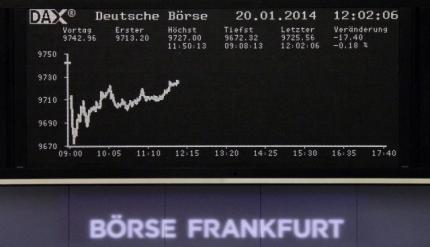Europe shares set for monthly loss on emerging markets worri
Bareksa • 03 Feb 2014

The curve of the German share price index DAX board at the Frankfurt stock exchange (REUTERS/Remote/Stringer)
FTSEurofirst on track for 1st monthly loss since August
Reuters - European shares were on course on Friday for their first monthly loss since August, hurt by fresh signs that the region's companies are being impacted by turbulence in emerging markets.
European equity indexes also weakened further after data showed a drop in euro zone consumer price inflation, which reinforced concerns among some investors of deflation.
The pan-European FTSEurofirst 300 index was down by 0.8 percent at 1,283.48 points in mid-session trading, putting the index on track for a fall of around 2.5 percent in January, after having risen for the previous four months.
Shares in Electrolux slid 6.8 percent lower after the Swedish home appliances maker posted a bigger-than-expected drop in quarterly earnings.
Electrolux was impacted by a slump in Brazil, whose economy has faced a fall in its national currency, and global equities have lost ground this week over problems in Brazil and other emerging markets, including Argentina, Ukraine and Turkey.
Emerging market economies have had a rough ride since the U.S. Federal Reserve last year first mooted a wind-down of its bond-buying programme, a driver of investment into emerging economies.
The FTSEurofirst 300 index slightly extended losses after the publication of the unexpected fall in euro zone inflation, and the euro zone's blue-chip Euro STOXX 50 index was down by 1.3 percent at 2,989.27 points.
"There's a plethora of bad news that the market has to absorb," said JNF Capital investment manager Ed Smyth.
According to data from Thomson Reuters StarMine, out of the 28 companies on the pan-European STOXX 600 index to have reported fourth quarter earnings so far, only 46 percent have reported earnings above analyst expectations. This is slightly lower than the long-term average of 47 percent.
EQUITIES STILL BEST ASSET CLASS?
Nevertheless, JNF Capital's Smyth said equities remained the best asset class, compared to bonds or cash, where returns have been hit by record low interest rates set by central banks.
Injections of liquidity by major world central banks, coupled with signs of a slow economic recovery in Europe, had driven a European stock market rally in 2013, with the FTSEurofirst 300 rising 16 percent last year.
Many investors with a longer-term view over the whole of 2014 remain positive on European equities this year, saying the stock market should gradually rise over the course of the year as the region's economic recovery slowly strengthens.
"The medium-to-long term upwards trend is still intact. Those who are calling for a collapse will be buried," said Smyth.
But traders such as ACIES Asset Management's Andreas Clenow said now was not the time to go back into the equity market.
"Most likely, the bull market is not over, but for now it looks shaky. I'm taking a very defensive stance in the short-term. We've closed out long positions and raised some cash," he said.